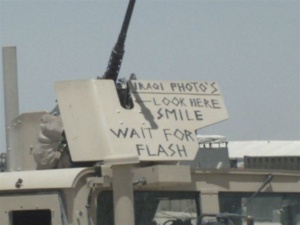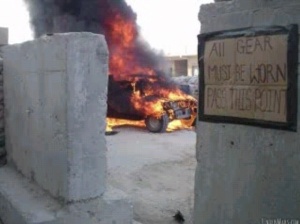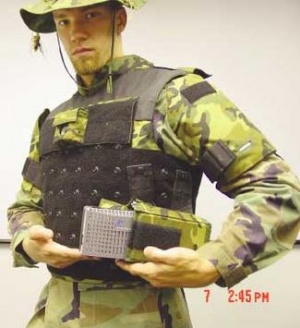Layalina Productions
Layalina Productions Inc. was launched in March 2002 as a non-profit, private sector corporation to develop and produce "informative and entertaining Arabic-language programming for licensing to satellite and cable television networks throughout the Arab Middle East and North Africa".[1] It is part of what is commonly called US public diplomacy (a fairly recent term for propaganda) efforts in the Middle East.
Contents
Founder's biography
Richard M. Fairbanks, III is the founder and Chairman of the Board of Layalina. According to Fairbanks' biography on the Center for Strategic and International Studies (CSIS) website:
- Richard Fairbanks joined CSIS in 1992 as senior counsel and assumed the role of managing director for domestic and international issues in 1994. He was named president and CEO in May 1999 and counselor in April 2000. His government service includes appointments as ambassador-at-large under President Ronald Reagan, chief U.S. negotiator for the Middle East peace process, and assistant secretary of state for congressional relations. Fairbanks has also served as associate director of the White House Domestic Council, adjunct professor of environmental law at Georgetown University, special assistant to the administrator of the Environmental Protection Agency, and founding partner of the Washington law firm Ruckelshaus, Beveridge and Fairbanks. From 1986 to 1993, he was president of the U.S. National Committee of the Pacific Economic Cooperation Council and was the international chair of the organization during 1991 and 1992. He currently serves on the executive committee of the U.S. Asia Pacific Council. He is also a member of the boards of SEACOR Holdings and GATX Incorporated, and is chairman of the board of Layalina Productions; a member of the Council on Foreign Relations and the Council of American Ambassadors; and founder of the American Refugee Committee of Washington. He received an A.B. from Yale University and a J.D. magna cum laude from Columbia University School of Law.[2]
SEACOR Holdings, Inc., of which Fairbanks is a member of the board of directors, is a multinational company that owns and operates marine and aviation assets primarily servicing the oil and gas industry worldwide. SEACOR Marine, for instance, operates "the world’s second largest fleet of offshore marine support vessels... servicing the global offshore oil and gas exploration and production industry". Their Seabulk tankers are an international petroleum and chemical shipping empire responsible for moving over 8 million tons of crude, chemicals and other products a year.[3] Fairbanks was a founding partner of the law practice Beveridge, Fairbanks and Diamond (now Beveridge and Diamond), P.C. (1974-1981).[4]
The point of public diplomacy
The potential threat to international business interests is a key reason for the concern to contribute to public diplomacy operations. According to Emmanuel Evita, partnerships such as the Transatlantic Business Dialogue are adopting "a proactive approach to head off the impact of anti-Americanism to their bottom lines in the long term".[5]
Jeffery Werner, chairman of the Transatlantic Business Dialogue (TABD) stated:
- The Transatlantic Business Dialogue is not looking to replace what the government does — the state does diplomacy — we are just looking to provide industry input (where damaged political relationships might affect industry).[6]
Other earlier public diplomacy efforts include America Abroad Media (AAM), the aim of which is described on its website as being "to harness the power of media to inform America and the world about the critical international issues of our time".[7]
AAM was started shortly after the 9/11 attacks by Aaron Lobel, a former research fellow at the Brookings Institution. Lobel believes that "non-partisan, non-government organizations" have the credibility government initiatives lack.[8] Keith Reinhard runs Business for Diplomatic Action featured in The Economist (who have co-sponsored some of Lobel's radio programs) for its efforts to use private industry for "out-recruiting bin Laden" and addressing anti-Americanism (or un-Americanism) abroad.[9]
Layalina is taking the "reality TV" approach[10] but its boards of advisors and directors (see "People", below) suggests that 'soft power' is intimately connected to business interests.
Soft power: The tactic of Muslim jihadists?
Soft power is a term used in international relations theory to describe the ability of a political body, such as a state, to indirectly influence the behavior or interests of other political bodies through cultural or ideological means. Fairbanks uses the old Vietnam war public diplomacy/soft power term "winning hearts and minds" to title a paper on the Middle East, presented to a Yale audience, that argues that the undercover subversion is the provenance of Muslim jihadists[11]to as opposed to Western intelligence agencies:
- The first "soft power" hints of the war first appeared on popular Arab satellite networks and websites where jihadists vowed to destroy the American way of life, one seen to interfere with their ultimate goal: establishing an Islamic caliphate to rule over the Muslim world. Over the last decade, sedate, controlled, and state-sponsored media have been replaced by satellite TV and the world wide web. These new media, which provide a de facto means of breaching traditional government controls, provide pan-Arab vehicles that jihadists exploit to appeal to their would-be followers — millions of disenchanted, unemployed or underemployed young Arabs under thirty — which constitute 70 percent of the population of the Arab world. More than three and a half years after the September 11 attacks and the start of the War on Terror, the United States still chases after terrorists, denying them the refuge they have enjoyed in such regions as formerly Taliban-controlled Afghanistan. In the battle of ideas, the US is deploying the very same tools first used by the jihadists: soft power.[12]
Fairbanks' article provides an insight into the material with which the US is countering the opinions of its adversaries: "mostly entertainment programming interspersed with short news briefs."[13] Here is an example of Layalina's "entertainment programming":
- The George Washington University will show an advance screening of On the Road in America, a reality travelogue series produced by Layalina Productions in association with Visionaire Media featuring the three Arab university students during a 10 week road trip on their first visit across the United States.[14]
With reference to the Broadcasting Board of Governors, the U.S. entity in charge of all international non-military broadcasts, which runs Radio Sawa (Arabic for "together") and Alhurra ("the free one") news, Fairbanks provides evidence of how the US uses soft power to deal with difficult political issues:
- The State Department also launched Hi magazine in July 2003, an Arabic lifestyle and fashion monthly that steers clear of political issues.[15]
For Fairbanks,
- This crucial task of providing a different view of our country and its people is too important to be left only to government. In order to reach the over 200 million-strong audience in 22 Arab countries, public diplomacy initiatives must be available on the indigenous media that the people of the region regularly watch."[16]
Members of an Advisory Group steered by Edward P. Djerejian on "Public Diplomacy for the Arab and Muslim World" (which published its report "Changing Minds, Winning Peace" in 2003) notes that the US has a lack of "strategic focus" for communicating foreign policy.[17] David M. Abshire, President of the Center for the Study of the Presidency, offered this testimony:
- Although the Discovery Channel and other quality stations have operations abroad, too many of America’s commercial media exports are low-quality products, such as reruns of Dallas and even pornography, because they are inexpensive and readily available.[18]
The Advisory Group report, notes Abshire, "calls for the creation of a grant-making organization that would fund the production and export of quality television and radio".[19] In Abshire's view, Layalina Productions "illustrates the creative potential that America’s private sector can bring to bear on this challenge."[20]
People
Board of Counselors
President George H. W. Bush - Honorary Chairman of the Board
Tarek Abdul-Meguid | David Abshire | Richard Allen | George Argyros | Thomas Ludlow Ashley | James Baker III | Samuel Berger | Wayne Berma | Reginald Brack | Zbigniew Brzezinski | John Chapoton | Lawrence Eagleburger | Richard Fairbanks | A.H. Farouki | Fred Fielding | Marc Ginsberg | Lee Hamilton | Don Hewitt | Carla Hills | Henry Kissinger | Maura Morey | Sam Nunn | Paul Russo | James Schlesinger | Brent Scowcroft | George Shultz | Damaris Skouras | Jeffrey Smulyan | Carl Spielvogel | Robert Strauss | John Whitehead | Frederick Whittemore | Daniel Yergin | Ezra Zilkha |[21]
Board of Directors
George L. Argyros - Director
George L. Argyros is the billionaire Chairman and CEO of Arnel & Affiliates, a diversified investment company based in California, and General Partner of Westar Capital, a private investment company.[22]
He is a retired U.S. ambassador to Spain, and a former member of the Advisory Committee for Trade Policy and Negotiations for the U.S. Trade Representative. As US Ambassador to Spain, Argyros is credited in one biography for:
- Forging a close alliance with King Juan Carlos and former President Jose María Aznar that resulted in Spain's support and participation in Operation Iraqi Freedom and Enduring Freedom [the US- and British-led war against Iraq].[23]
President José María Aznar was appointed to the Board of Directors of News Corporation in 2006.[24]
In the News Corporation press release announcing Aznar's appointment, he is described as "a firm supporter of Spain’s close relationship with the United States". The press release also notes that "One of Mr. Aznar's main concerns is the battle against terrorism".[25]
Aznar's party was voted out of power after his government blamed the 2004 Madrid bombings on Basque separatists when Islamic extremists had in fact committed the atrocities in which 191 people died. [26]
Prior to Argyros's ambassadorship, he was a member of the board of Rockwell International Corporation and Newhall Land and Farming Company.[27] Rockwell sold its former aerospace and defense businesses to The Boeing Company in 1996. Previously it had been one of five companies in the United States supplying the federal government with military aircraft fighters and bombers during the 1990s. Its predecessor company, North American, built more airplanes for the U.S. military than any other company during the war years. North American became involved in the development of rockets, guidance systems, and atomic energy. It created Rocketdyne, Autonetics, and Atomics International as new divisions to pursue research in those individual fields: much of its rocket and missile technology was acquired from captured German data.[28]
Argyros is on the Board of Directors for First American Corporation; DST Systems, Inc.; Doskocil Manufacturing Company; and Igloo Products Corp. He is an International Councillor and Trustee of the Center for Strategic and International Studies in Washington, DC; Chairman of the Board of Directors for The Beckman Foundation; Board Member of the U.S. Chamber of Commerce; Founding Chairman for the Nixon Center; Horatio Alger Association. In the 1980s, Argyros was co-owner of AirCal. He has also served as a board member of the Federal Home Loan Mortgage Corporation (FreddieMac).[29]
Thomas Ludlow Ashley - Director
Thomas Ludlow Ashley joined the staff of Radio Free Europe (RFE) in 1952, serving in Europe as Co-Director of the press section and later as assistant director of special projects, resigning March 1, 1954.[30] RFE was a broadcasting organization established in 1950 with the original purpose of broadcasting news to countries behind the Iron Curtain during the cold war. In 1975, it was merged with Radio Liberty. (RL), a similar enterprise that broadcast to the nations inside the Soviet Union. RFE receives most of its funding from the U.S. Congress. Until 1971, the funds were channeled through the CIA; since that time the funds have been received in the form of grants through the Broadcasting Board of Governors of the U.S. Information Agency, mentioned above. The collapse of the USSR brought about changes including budget cuts and the relocation of headquarters from Munich, Germany, to Prague, the Czech Republic, in 1995. Broadcasts are now sent to E and SE Europe, Russia, the Caucasus, Central Asia, and the Middle East.[31]
While in Congress, Ashley served as Chairman of the Select Committee on Energy (Ad Hoc) (Ninety-fifth Congress) and of the Committee on Merchant Marine and Fisheries (Ninety-sixth Congress). In 1981, he founded and became the president of a legal and congressional consulting firm in Washington, D.C. Ashley is also a director and trustee of the George Bush Presidential Library Foundation, along with Jeb (a director) and Neil Bush (a trustee).[32][33][34]
John E. Chapoton - Director
John Chapoton has been a partner of Brown Advisory, an investment firm. Prior to 2000, he was the managing partner of the Washington office of the Vinson & Elkins law firm. From 1981 to 1984, during the first term of President Reagan, Chapoton served as Assistant Secretary for Tax Policy of the U.S. Treasury Department. He is a member of the American Law Institute, the American Bar Association's Tax Section (former Vice Chair) and a Fellow of the American college of Tax Counsel (former Regent). In addition to Layalina, Chapoton serves on the Boards of Saul Centers, Inc. and StanCorp Financial.[35]
Ambassador Walter L. Cutler - Director
Walter Cutler is a career U.S. Foreign Service Officer. He was twice ambassador to Saudi Arabia, ambassador to Tunisia and Zaire, and was ambassador-designate to Khomeini's Iran before diplomatic relations were broken. In addition to a previous assignment to Iran, he served in Algeria, Cameroon, Korea, and Vietnam. He was also Senior Deputy Assistant Secretary of State for Congressional Relations, and Staff Assistant to the Secretary of State. Following his diplomatic service, Cutler directed Meridian International Center, of which he is now President Emeritus. Ambassador Cutler is also a Senior Advisor to the Trust Company of the West. He is a member of the Council on Foreign Relations, the American Academy of Diplomacy, the Washington Institute of Foreign Affairs. the American Iranian Council.He regularly visits Saudi Arabia and other Gulf states. Cutler is a graduate of Wesleyan University and holds an M.A. from the Fletcher School of International Law and Diplomacy.[36]
Ambassador Marc Charles Ginsberg - President
Marc Charles Ginsberg serves as President of Layalina Productions, Inc. His three-decade government and private sector career has largely been focused on the Middle East as a diplomat, an international corporate lawyer, and investment banker. He is also CEO and Managing Director of Northstar Equity Group, a global financial advisory and capital sourcing company, and an affiliate of APCO Worldwide, a global corporate public affairs and communication firm.[37] Before joining Northstar, Ginsberg was the founder of Georgetown Global Investments Corporation, a placement firm specializing in Middle East technology ventures.[38]
- Ginsberg develops investor alliances for "high-tech" investments, and represents post-incubator Internet and biotechnology companies in the U.S., Europe, and the Middle East. He also develops target-oriented revenue, and sales and branding strategies for new e-commerce ventures. Ginsberg also advises major U.S. telecommunications and energy companies in public tender and private sector competitions throughout southern Europe and the Middle East by developing unique market penetration strategies.[39]
From 1978-1981 Ginsberg served as Deputy Senior Advisor to President Carter for Middle East Policy at the White House and from 1994 to 1998, Ginsberg served as U.S. Ambassador to Morocco where he engaged in public diplomacy outreach in the Arab world. He also served as the U.S. Coordinator for Mediterranean Trade, Investment and Security Affairs from 1998-1999, in this capacity, he was responsible for evaluating and coordinating American trade, investment, and national security policies in the Mediterranean Basin for the U.S. State Department. As President Clinton's Deputy Press Secretary for Foreign Affairs (the first U.S. Ambassador of Jewish heritage to a Middle East nation). Prior to his public service, Ginsberg practiced international commercial and corporate law in the Middle East. He helped draft Egypt's first modern commercial statute and is considered an authority on Middle East investment and economic issues.[40]
Aside from his work with the federal government, Ginsberg served as Senior Partner and Chief Financial Officer, at Galland, Kharasch, Morse & Garfinkle. In this capacity, he represented international investment banks in emerging market penetration, and multinational aviation, telecommunications and energy companies with emphasis on project finance, equity investments, international IPOs, joint venture development, and privatizations.[41]
He serves on the Board of directors of Xybernaut (which provides high tech equipment for the government and military.[42]
Xybernaut provides the US Department of Defense (DOD) and intelligence services with everything from basic computer and networking services to cutting-edge technology used by special operators in the field during Operation Iraqi Freedom. Its wearable computer TAC-V is employed by all four branches of the military: Army, Navy, Air Force, and Marines. The Army uses the TAC-V for the AH-64 Apache and RAH-66 Comanche helicopter. It is used on the Navy’s aircraft carriers and is integral in the maintenance of the Tomahawk cruise missile, which was used heavily in Operation Iraqi Freedom. The Air Force employs the TAC-V in the maintenance of the B-1B Lancer bomber and the Marine Corps employs the TAC-V for maintenance of the AH-1W Super Cobra helicopter gunship.[43]
Ginsberg is a member of the Council on Foreign Relations.[44] In 2000, Vice President Al Gore recruited Ginsberg to be the Senior Foreign Policy Coordinator for his Presidential campaign.[45] During the Gulf War, Ginsberg was a consultant to CBS, CNN and NBC News.[46]
He is also a director of the National Security Network which campaigned against President George W. Bush's handling of the war.[47] Mostly Democrats, they were worried that:
- "With no end in sight, the Bush plan for Iraq is to avoid the appearance of defeat in the next two years and pass the buck to the next president."[48]
Ambassador Paul Russo - Director
Paul Russo is president of Paul Russo & Associates, a Washington, DC firm specializing in international trade and government relations. Russo was appointed as the United States Ambassador to Barbados and the Eastern Caribbean in 1986. Prior to assuming that position, he was the President of Capitol Consultants, Inc., a Washington, DC consulting firm specializing in government relations and international trade. Russo began his services in the Reagan Administration as Special Assistant to the President for Political Affairs at the White House from 1981-1983, and he then became Deputy Under Secretary of Labor. Russo served in the 1976, 1980 and 1984 Presidential campaign efforts of Ronald Reagan. In 1978, he founded and was named Executive Director and Treasurer of Campaign America, a political action committee chaired by former U.S. Senate Majority Leader Bob Dole. Russo also served as Special Assistant to California's governor, Ronald Reagan, from 1973-1975. Since 1991, Russo has been a faculty member of Georgetown University's School for Continuing Education, teaching a course on the modern U.S. Presidency. Russo is a member of the Board of Directors of the Council of American Ambassadors and also serves on the Advisory Board of the Eastern International Academy, a private training facility in Amman, Jordan that specializes in training security forces for the Government in Iraq. Russo has served on the boards of a number of national organizations and federal advisory councils, including the National Easter Seal Society. The President's National Commission for Employment Policy, and the Federal Advisory Council on Unemployment Insurance.
Frederick B. Whittemore - Director
Advisory Director at Morgan Stanley and Company in New York, Whittemore has been with the firm for 35 years, becoming a partner in 1967, Managing Director since the firm's incorporation in 1970 and Advisory Director since January 1989. He has served as Governor and Vice Chairman of the American Stock Exchange, International President of the Pacific Basin Economic Corporation (PBEC), and Chairman of the U.S. National Committee for Pacific Economic Cooperation. Whittemore is a member of the Council on Foreign Relations, Director of Southern Pacific Petroleum, Former Director of the Dome Petroleum and Key Pharmaceutical Corporation, and a member of the American Australian Association, Chesapeake, and KOS Pharmaceuticals. He serves on a number of noncorporate boards, including that of the Center for Strategic and International Studies (CSIS), the Aspen Institute and the Whittemore Business School of the University of New Hampshire. Whittemore was formerly Chairman of the Board of the Amos Tuck School of Business Administration, serves as Chairman of the American Australian Educational Studies and is Director of the British American Educational Foundation.[49]
Further reading, notes
Further reading
- Background Profile, The Richard M. Fairbanks Foundation, Inc. website, accessed January 2009.
- Jason Leopold, "If Not Then, Why Now? Bush Invokes Saddam's Crimes That His Father Failed to Punish", CounterPunch, March 17 2003. This states that Fairbanks, a former assistant secretary of state and special negotiator in the Middle East peace process, "left the Reagan administration in 1985 to become a partner in the prestigious Washington law firm of Paul, Hastings, Janofsky & Walker, which, between December 1985 and March 1990, was a registered agent for the government of Iraq. Fairbanks was listed as personally handling the firm's Iraqi account".
It adds that President Bush took Fairbanks' views so seriously that he named him co-chairman of a group of Middle East experts to advise him during the 1988 presidential campaign.
- The administration provided Baghdad with $1 billion in guaranteed credits in 1989 to enable Iraq to buy U.S. food supplies while pouring money into missiles, chemical weapons production and the search for an atomic bomb. After Congress voted at the end of 1989 to bar U.S. Export-Import Bank credits to Iraq, President Bush signed a waiver on Jan. 17. He said it was in America's national interest to continue providing Baghdad with $200 million a year in subsidized financing.
- "Interview with Richard Fairbanks", Reality TV, Diplomacy Style], February 2, 2007, Archived at the Wayback Machine, March 10 2007.
- Details on the Justice Department's investigation of Rockwell for possible criminal violations of environmental laws in connection with its activities at the Rocky Flats nuclear weapons plant.
Notes
- ↑ About Layalina, Layalina Productions website, accessed 21 September 2007
- ↑ "Richard Fairbanks", CSIS website, accessed January 2009
- ↑ "Seacor Holdings Inc.: Local Service, Global Strength", SEACOR Holdings, Inc., 2006.
- ↑ "Nomination of Richard Fairbanks To Have the Rank of Ambassador While Serving as Special Adviser to the Secretary of State", The American Presidency Project, 9 December 1982, accessed January 2009.
- ↑ Emmanuel Evita, "Firms and non-profits try diplomacy", UPI, 19 November 2004, accessed January 2009.
- ↑ Emmanuel Evita, "Firms and non-profits try diplomacy", UPI, 19 November 2004, accessed January 2009.
- ↑ "America Abroad Media - Our Mission and Philosophy", America Abroad Media website, accessed January 2009.
- ↑ Emmanuel Evita, "Firms and non-profits try diplomacy", UPI, 19 November 2004, accessed January 2009.
- ↑ Emmanuel Evita, "Firms and non-profits try diplomacy", UPI, 19 November 2004, accessed January 2009.
- ↑ "[Layalina, public diplomacy for the reality TV era]", Arab Media blogspot, 1 February 2007, accessed January 2009.
- ↑ Jihad is an Arabic word for struggle (either in an internal or external sense). The word jihadist has come to be applied in a derogatory way in the context of the 'war of terror' to mean a holy or Allah-ordained war against non-Muslims.
- ↑ Richard Fairbanks "Hearts and Minds in the Middle East", 15 June 2005, accessed January 2009.
- ↑ Richard Fairbanks "Hearts and Minds in the Middle East", 15 June 2005, accessed January 2009.
- ↑ GW hosts producers of new reality travelogue series for pre-screening and question and answer session, April 18, 2007", press release, George Washington University, 12 April 2007, accessed January 2009.
- ↑ Richard Fairbanks "Hearts and Minds in the Middle East", 15 June 2005, accessed January 2009.
- ↑ Richard Fairbanks "Hearts and Minds in the Middle East", 15 June 2005, accessed January 2009.
- ↑ "[www.state.gov/documents/organization/24882.pdf Changing Minds, Winning Peace: A new strategic direction for U.S. public diplomacy in the Arab and Muslim world]", Advisory Group on Public Diplomacy for the Arab and Muslim World, chaired by Edward P. Djerejian, October 1, 2003, p. 52, accessed January 2009.
- ↑ David M. Abshire, "Testimony Before the Subcommittee on Commerce, Justice, and State, the Judiciary, and Related Agencies of the House Appropriations Committee", 4 February 2004, p. 7, accessed January 2009.
- ↑ David M. Abshire, "Testimony Before the Subcommittee on Commerce, Justice, and State, the Judiciary, and Related Agencies of the House Appropriations Committee", 4 February 2004, p. 8, accessed January 2009.
- ↑ David M. Abshire, "Testimony Before the Subcommittee on Commerce, Justice, and State, the Judiciary, and Related Agencies of the House Appropriations Committee", 4 February 2004, p. 9, accessed January 2009.
- ↑ "Board of Counselors", Layalina Productions website, accessed January 2009.
- ↑ "Board of Directors", Layalina Productions website, accessed January 2009.
- ↑ "Biography of the Honorable George L. Argyros", The Open World Leadership Center website, accessed January 2009.
- ↑ "News Corporation Appoints José María Aznar To Board Of Directors", press release, News Corporation, 21 June 2006, accessed January 2009.
- ↑ "News Corporation Appoints José María Aznar To Board Of Directors", press release, News Corporation, 21 June 2006, accessed January 2009.
- ↑ Dan Milmo, "Former Spanish PM to join Murdoch board", The Guardian, 22 June 2006, accessed January 2009.
- ↑ http://www.csis.org/component/option,com_csis_experts/task,view/type,34/id,226/
- ↑ "Rockwell International Corporation", Funding Universe website, accessed January 2009.
- ↑ "George Argyros", Center for Strategic & International Studies website, accessed January 2009.
- ↑ "About Layalina", Layalina Productions website, accessed January 2009.
- ↑ ""Radio Free Europe", InfoPlease, accessed January 2009.
- ↑ "About Layalina", Layalina Productions website, accessed January 2009
- ↑ "Board of Directors", George Bush Presidential Library Foundation website, accessed January 2009,
- ↑ "Neil Bush", NNDB website, accessed January 2009.
- ↑ "About Layalina", Layalina Productions website, accessed January 2009.
- ↑ "About Layalina", Layalina Productions website, accessed January 2009.
- ↑ "About Layalina", Layalina Productions website, accessed January 2009.
- ↑ "U.S. should do more to help Kingdom develop new foreign investment strategy — former envoy", Jordan Times, 27 December 1998.
- ↑ "The Making of U.S. Foreign Policy -- Biographies of the Authors Ambassador Marc Charles Ginsberg", U.S. Foreign Policy Agenda, September 2000, accessed January 2009.
- ↑ "The Making of U.S. Foreign Policy -- Biographies of the Authors Ambassador Marc Charles Ginsberg", U.S. Foreign Policy Agenda, September 2000, accessed January 2009.
- ↑ "The Making of U.S. Foreign Policy -- Biographies of the Authors Ambassador Marc Charles Ginsberg", U.S. Foreign Policy Agenda, September 2000, accessed January 2009.
- ↑ "Xybernaut Appoints Former U.S. Ambassador To Morocco To Board of Directors", Business Wire, 3 March 2003, accessed January 2009.
- ↑ "High-tech spear in the war on terrorism", Herald Tribune.com, 1 July 2003, accessed January 2009.
- ↑ "About Layalina", Layalina Productions website, accessed January 2009.
- ↑ "Public Diplomacy: A Strategy for Reform: A Report of an Independent Task Force on Public Diplomacy", Sponsored by the Council on Foreign Relations, 30 July 2002, p. 34.
- ↑ "Marc Ginsberg, Former U.S. Ambassador to Morocco & Fox News correspondent", Greater Talent Network Inc. website, accessed January 2009.
- ↑ "A Principled National Security", undated article archived in the Wayback Machine 2 February 2008, accessed January 2009.
- ↑ "A Principled National Security", undated article archived in the Wayback Machine 20 January 2008, National Security Network, accessed January 2009.
- ↑ "About Layalina", Layalina Productions website, accessed January 2009.





